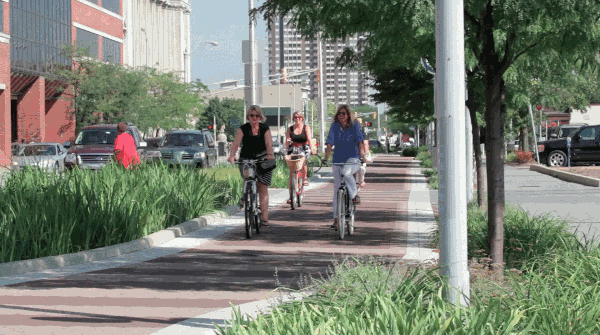Sorry, I don’t have time to use the car to get there. That’d take too long—I’d better bike instead.
No, I don’t mean “biking saves you money and time is money.” I mean biking actually saves you time.
No, I don’t just mean during rush hour. Sure, everybody knows that in a city during rush hour, bicycles usually travel faster than cars. No, I mean biking is always more time-efficient than driving.
In fact, a study released last year found that riding a bicycle transports you from place to place instantaneously. As in, it takes no time at all.
Stay with me.
Naturally, this study came out of the University of Utrecht. Utrecht is a Dutch city that’s about the size of Wichita, with the minor difference that about half of all trips of five miles or less in the city happen on bicycles. That means that the Utrecht scientists had really good data to analyze. They studied the habits of 50,000 Dutch people, most of whom rode bicycles for various amounts of time each day, over the course of many years.

Here’s what the study found: for every additional 75 minutes a week that you spend on a bike (that is, for every 11 minutes per day) you generally increase your lifespan by six months.
This isn’t super surprising in principle. Virtually every scientific study of what makes us healthy is just a complicated way of saying one of two things that we all already know: (1) don’t eat much junk food and (2) get your heart beating for a little bit each day, the more the better. Maybe that’s why this study didn’t get wall-to-wall coverage when it came out in 2015: it seemed obvious.
But the longer you think about this finding, the more interesting it becomes.
Eleven minutes per day. That’d be 3,906 minutes per year. Over the course of, say, 70 years, it’s 273,385 minutes.
Which comes out to … six months.
Which is exactly the amount of extra lifespan that these scientists discovered that 11 more minutes of biking per day will give you. Which means…
Woah.
Every minute you spend on a bicycle increases your lifespan by one minute.
 I don’t know about you, but in my case I know that riding a bicycle also makes me happier. The first day I rode a bike to work, I could feel the endorphins tingling appreciatively in my elbows.
I don’t know about you, but in my case I know that riding a bicycle also makes me happier. The first day I rode a bike to work, I could feel the endorphins tingling appreciatively in my elbows.
But when I’m deciding whether to go somewhere on a bike, I still find myself weighing that happiness against time. Can I afford those extra 10 minutes? I could spend those 10 minutes writing emails, or finally organizing my desk, or just relaxing with Facebook.
But those things don’t actually make me happy. (OK, having a clean desk does, but we both know I’m not actually going to do that.) And one thing is for sure: those minutes don’t come back.
When you think about it, this study means that any time you spend on a bicycle is literally free time. Every minute you spend is coming back to you. Because bicycling is going to give you back all the time you invested, there’s no net time lost.
Which is why, if you do the math, a bicycle is basically a teleporter.
A teleporter that makes you happy.
Saves you money, too.
Beam me up, Scotty.
[Editor’s Note: This article has been cross-published from PeopleForBikes’s Green Lane Project blog. Follow along with PeopleForBikes on Twitter and Facebook.]



This all makes sense in theory, but it is not entirely practical here. I am currently watching a very nice spring rain through my office window. Even though it would be very easy to bike from my house to my office, I cannot actually show up for work disheveled and wet. I love to ride me bike for exercise, but my car will always be quicker and more practical in Louisville.
Biking here makes so much sense to me. It’s flat, cheap, and you avoid so much of the terrible traffic. It was glorious to bike by the cars moving one inch per hour during Thunder. It is pretty easy to check the weather and make a call. You can definitely commute by bike most of the time here if you are willing to check the weather and do a little planning.
Margaret: You are right; Louisville is fairly flat and bike-able. Once again though, most of us cannot show up for work sweaty, disheveled, or wet. As you know, our weather is unpredictable. This morning it was sunny at my house as I left for work, and there was a only a 15% chance of rain. During the short trip to my office, it went from sunny to a steady rain. Now it is clear again. I am very much pro-biking, but it is not a practical form of daily transportation for most of us.
Also, bikes are required to follow traffic rules for vehicles. If a bike rider is zipping past cars in traffic, that rider is probably breaking a variety of traffic laws. That is irresponsible and more than a little dangerous for the rider and the other drivers.
Why are you living so far away that you end up so sweaty from a bike ride in the morning when it is not hot yet? Sounds like the problem is with people who choose to live miles and miles away from work and then resign themselves to wasting away in a car, placing the blame on the weather and Louisville’s planning. Louisville is far from the most rainy place in the world, and it doesn’t seem to stop the more highly paid and respectable people of other cities where it rains more and they bike more like Seattle and Portland.
Suzanne: In your world, people should all be required to live within a 10-15 minute bike ride from where they work? What if you change jobs? Do you think that you should be required to sell your house and move? Obviously there are some workplaces with “relaxed” standards of dress and hygiene, but many of us don’t have jobs like that.
I concur w/ Jeff. The weather in Kentucky is highly variable & frequently unpredictable. Winter lows around zero with wind chill indices even lower and summer highs around 100 w/ humidity indices higher yet make if physically dangerous for unacclimated cyclists. Think frostbite, heat stroke, asthma, et al. Besides all of that, look at where builders, developers and real estate agents are creating new housing : way outside 265. Biking 5 miles or less works well in Utrecht, but Louisville is not evolving in the same style.
Wow how in the world did anyone ever get anywhere in this extreme climate before we had air conditioned cars?
Sorry Suzanne, before paved roads and personal automobiles, travel was arduous and unpleasant. Average people did not go very far very often. Families were forced to lived in crowded conditions near factories and workplaces. Only the wealthy could escape. Farm families could not go too far past their county seats either. It is fun to romanticize about life in the city 100 years ago, but the reality is that cars freed the average person from a lot of unpleasant conditions. Unless you are a member of the Amish faith or some sort of ardent central planning enthusiast, you probably prefer personal automobiles for your daily commute in a society where you are free to choose. Also, I have had cars without air-conditioning when I was younger – I can assure you that having A/C is not essential, but it is certainly better. I do live close enough to ride my bike to work, but I am a great deal freer, more comfortable, and safer with my car.
Fortunately we won’t have to throw out all of the technology we have today in public transport and generally when car society inevitably collapses and your big suburban house is going for pennies on the dollar.